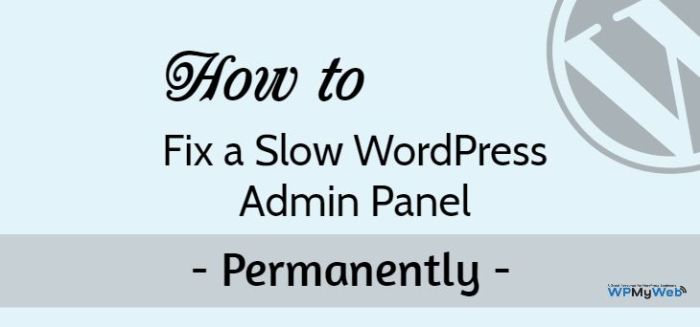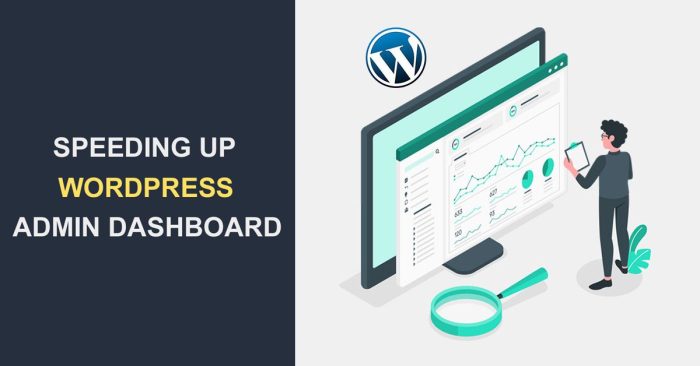How to Troubleshoot Slow WordPress Admin Panel – A sluggish WordPress admin panel can significantly hinder your workflow. This comprehensive guide will walk you through various troubleshooting steps to identify and resolve the causes of slow loading times, ensuring a smooth and efficient administrative experience. We’ll cover common culprits, from plugin conflicts to server-side issues, providing practical solutions along the way. This guide is designed to be -friendly, incorporating relevant s such as WordPress admin slow, slow WordPress dashboard, speed up WordPress admin, WordPress admin panel performance, troubleshooting WordPress, and many more.
Identifying the Root Cause: Common Culprits of a Slow WordPress Admin Panel
Before diving into solutions, it’s crucial to pinpoint the source of the problem. Several factors can contribute to a slow admin panel. Let’s explore some of the most frequent offenders:
1. Resource-Intensive Plugins
Many WordPress plugins, while beneficial, can consume significant server resources. Overly complex plugins or those with inefficient code can drastically slow down the admin panel. Deactivate plugins one by one to isolate the culprit. Start by deactivating recently installed plugins first. Observe if the speed improves after deactivating each plugin.
If a particular plugin is causing the slowdown, consider finding a lighter alternative or contacting the plugin developer for support.
2. Theme Conflicts
Your WordPress theme plays a vital role in the admin panel’s performance. A poorly coded or bloated theme can lead to slow loading times. Try switching to a default WordPress theme (like Twenty Twenty-Three) temporarily to see if this resolves the issue. If the admin panel speeds up, your current theme is likely the problem. You might need to find a lighter, more optimized theme, or contact your theme’s developer for assistance.
3. Database Issues
A bloated or poorly optimized database can significantly impact the admin panel’s speed. Large databases with excessive revisions, auto-drafts, and spam comments can slow things down. Use a plugin like WP-Optimize or similar database cleanup tools to optimize your database. Regularly deleting unnecessary data will improve performance.
4. Server-Side Problems
Sometimes, the problem lies not within your WordPress installation but with your hosting server. Insufficient server resources (RAM, CPU, etc.), slow database queries, or network connectivity issues can all contribute to a slow admin panel. Contact your hosting provider to investigate server-side performance and discuss potential upgrades or optimizations.
5. Caching Issues
While caching is generally beneficial for website speed, improperly configured caching plugins or a lack of server-side caching can sometimes hinder the admin panel’s performance. Review your caching plugin settings or consult your hosting provider to ensure proper caching is implemented. Sometimes, clearing the cache can help resolve temporary slowdowns.
6. Too Many Plugins Activated
Having numerous plugins activated, even if individually they’re not resource-intensive, can lead to a cumulative effect, slowing down your admin panel. Regularly review your active plugins and deactivate those you no longer need. Aim for a streamlined plugin setup for optimal performance.
Troubleshooting Steps: A Practical Guide
Let’s delve into practical steps you can take to diagnose and fix your slow WordPress admin panel:
1. Deactivate Plugins Systematically

Source: wpmyweb.com
As mentioned earlier, systematically deactivating plugins is a crucial first step. Start with recently installed plugins. After deactivating a plugin, check if the admin panel’s speed improves. This helps pinpoint the culprit plugin causing the slowdown.
2. Switch to a Default Theme
Temporarily switching to a default WordPress theme helps determine if your current theme is contributing to the slow performance. If the admin panel speeds up, focus on optimizing your current theme or replacing it with a more efficient one.

Source: fixrunner.com
3. Optimize Your Database
Use a database optimization plugin or manually remove unnecessary data like revisions, drafts, and spam comments. A cleaner database translates to faster loading times.
4. Check Server Resources
Contact your hosting provider to check your server’s CPU usage, RAM, and database query performance. If resources are insufficient, consider upgrading your hosting plan.
5. Clear Browser Cache and Cookies
Sometimes, your browser’s cached data can interfere with website performance. Clearing your browser’s cache and cookies can resolve temporary slowdowns.
Update WordPress Core, Plugins, and Themes:
Update WordPress Core, Plugins, and Themes:
Ensure that your WordPress core, plugins, and themes are updated to their latest versions. Updates often include performance improvements and bug fixes.
7. Use a Performance Plugin
Plugins like WP Rocket, Perfmatters, or LiteSpeed Cache can significantly improve your website’s performance, including the admin panel. These plugins offer various optimization features, including caching, minification, and image optimization.

Source: wp-rocket.me
8. Increase PHP Memory Limit
A low PHP memory limit can cause performance issues. You can increase this limit in your `wp-config.php` file. Consult your hosting provider’s documentation for instructions on how to safely modify this setting.
Frequently Asked Questions (FAQ)
- Q: My WordPress admin panel is extremely slow. What should I do first?
A: Begin by deactivating plugins one by one to identify potential conflicts. Switching to a default theme can also help pinpoint theme-related issues.
- Q: How can I optimize my WordPress database?
A: Use a plugin like WP-Optimize or similar tools to remove unnecessary data such as revisions, auto-drafts, and spam comments. Regularly cleaning your database will improve performance.
- Q: My hosting provider says my server resources are fine. What else could be wrong?
A: Even with sufficient server resources, poorly coded plugins or themes can still cause slowdowns. Check for conflicts and optimize your code where possible.
- Q: What is the best way to speed up my WordPress admin panel?
A: A combination of strategies is often most effective. This includes optimizing your database, deactivating unnecessary plugins, switching to a lightweight theme, and using a performance plugin.
- Q: Are there any tools to diagnose WordPress performance issues?
A: Yes, tools like Query Monitor and Debug Bar can help identify performance bottlenecks within your WordPress installation.
Resources
- WordPress.org
-Official WordPress website - WordPress Developer Resources
– For developers seeking advanced troubleshooting solutions - Kinsta Blog – Speed Up WordPress
– A helpful article on optimizing WordPress performance
Call to Action: How To Troubleshoot Slow WordPress Admin Panel
Addressing a slow WordPress admin panel is crucial for maintaining productivity. By following the troubleshooting steps Artikeld in this guide, you can identify and resolve the underlying causes, ensuring a smooth and efficient administrative experience. Don’t hesitate to contact your hosting provider or a WordPress expert if you need further assistance.
FAQ Section
What if clearing the cache doesn’t solve the problem?
If clearing the cache doesn’t improve speed, the issue likely lies elsewhere. Consider deactivating plugins one by one to identify potential conflicts or resource-intensive extensions. You may also need to investigate your server resources or database optimization.
How often should I perform maintenance on my WordPress site to prevent slowdowns?
Regular maintenance is key. Aim to clear your cache weekly, update plugins and themes regularly, and optimize your database at least monthly. The frequency might depend on your site’s traffic and activity levels.
Can a slow admin panel affect my website’s front-end performance?
While not directly related, a consistently slow admin panel might indicate underlying performance issues that could eventually affect your website’s front-end speed. Addressing the admin panel issues is a proactive step towards overall website optimization.